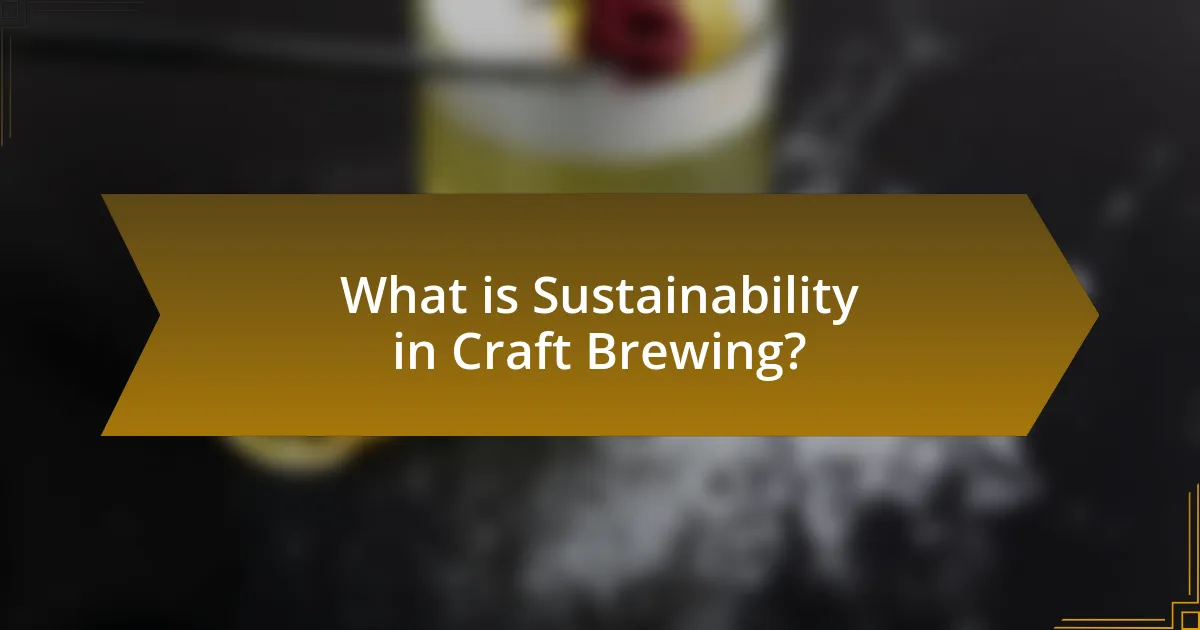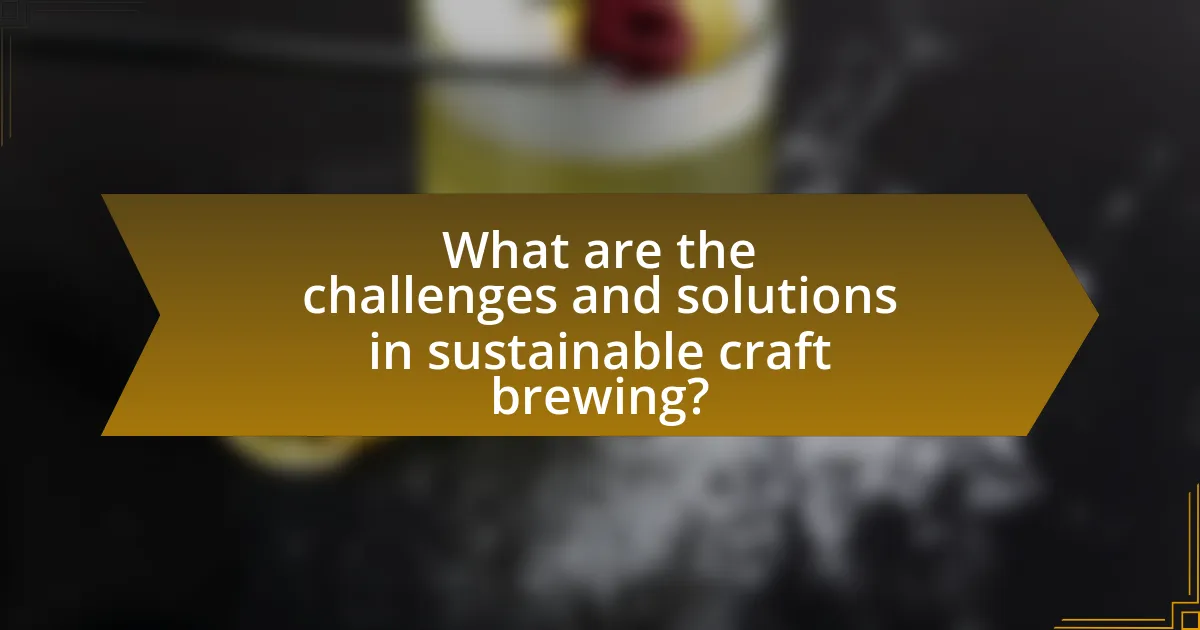Sustainability in craft brewing encompasses practices aimed at reducing environmental impact while ensuring economic viability and social responsibility. Key strategies include utilizing renewable energy, conserving water, recycling waste, and sourcing ingredients locally. The article explores the definition of sustainability in brewing, its importance, current trends, and the challenges faced by the industry, such as high resource consumption and regulatory hurdles. It also highlights innovative solutions and best practices that breweries can adopt to enhance their sustainability efforts, ultimately aligning with consumer preferences for eco-friendly products.

What is Sustainability in Craft Brewing?
Sustainability in craft brewing refers to the practices and strategies implemented by breweries to minimize their environmental impact while maintaining economic viability and social responsibility. This includes using renewable energy sources, reducing water consumption, recycling waste materials, and sourcing ingredients locally to lower carbon footprints. For instance, a study by the Brewers Association highlights that many craft breweries have adopted energy-efficient technologies, resulting in a 20% reduction in energy use on average. These efforts not only contribute to environmental conservation but also enhance the brewery’s brand reputation and customer loyalty.
How is sustainability defined in the context of craft brewing?
Sustainability in the context of craft brewing is defined as the practice of producing beer in a manner that minimizes environmental impact while promoting social and economic responsibility. This includes using renewable energy sources, reducing water consumption, recycling materials, and sourcing ingredients locally to decrease carbon footprints. For instance, many craft breweries implement waste reduction strategies, such as repurposing spent grains for animal feed or composting, which not only conserves resources but also supports local agriculture.
What are the key principles of sustainable brewing practices?
The key principles of sustainable brewing practices include resource efficiency, waste reduction, and the use of renewable energy sources. Resource efficiency involves optimizing water and ingredient usage to minimize environmental impact; for instance, breweries can implement water recycling systems to reduce consumption by up to 50%. Waste reduction focuses on minimizing byproducts and utilizing spent grains for animal feed or composting, which can divert significant waste from landfills. Additionally, employing renewable energy sources, such as solar or wind power, can significantly lower a brewery’s carbon footprint, with some breweries achieving up to 100% renewable energy usage. These principles collectively contribute to a more sustainable brewing industry, aligning with the growing consumer demand for eco-friendly practices.
How does sustainability impact the brewing process?
Sustainability significantly impacts the brewing process by promoting resource efficiency and reducing environmental footprints. Breweries implement practices such as water conservation, energy efficiency, and waste reduction to minimize their ecological impact. For instance, many craft breweries recycle water used in the brewing process, which can reduce water consumption by up to 50%. Additionally, utilizing renewable energy sources, like solar or wind power, can decrease greenhouse gas emissions associated with brewing. These sustainable practices not only benefit the environment but also enhance the brewery’s brand reputation and appeal to environmentally conscious consumers.
Why is sustainability important for craft breweries?
Sustainability is important for craft breweries because it enhances their operational efficiency and reduces environmental impact. By implementing sustainable practices, craft breweries can minimize waste, conserve water, and lower energy consumption, which not only benefits the environment but also reduces operational costs. For instance, a study by the Brewers Association found that breweries that adopt water conservation measures can save up to 30% on water usage, significantly lowering their utility bills. Additionally, sustainable practices can improve a brewery’s brand image, attracting environmentally conscious consumers and fostering customer loyalty.
What environmental challenges does the brewing industry face?
The brewing industry faces significant environmental challenges, including water usage, energy consumption, waste management, and carbon emissions. Water is a critical resource in brewing, with breweries consuming up to seven gallons of water for every gallon of beer produced, leading to concerns about water scarcity in some regions. Energy consumption is another challenge, as brewing processes require substantial energy, contributing to greenhouse gas emissions; for instance, breweries can account for up to 1% of total industrial energy use in some countries. Waste management is also problematic, as breweries generate large amounts of spent grains and other byproducts, which need to be disposed of or repurposed sustainably. Lastly, carbon emissions from transportation and production processes further exacerbate the industry’s environmental footprint, with some breweries actively seeking to reduce their carbon footprint through renewable energy sources and improved efficiency measures.
How can sustainable practices mitigate these challenges?
Sustainable practices can mitigate challenges in craft brewing by reducing resource consumption and minimizing waste. For instance, implementing water conservation techniques can decrease water usage by up to 50%, addressing the challenge of water scarcity in brewing. Additionally, utilizing renewable energy sources, such as solar or wind power, can lower carbon emissions significantly, contributing to climate change mitigation. Furthermore, adopting circular economy principles, like repurposing spent grains for animal feed, can reduce landfill waste and enhance resource efficiency. These practices not only address environmental challenges but also improve operational efficiency and cost savings for breweries.
What are the current trends in sustainable craft brewing?
Current trends in sustainable craft brewing include the use of renewable energy sources, water conservation techniques, and waste reduction practices. Many breweries are adopting solar and wind energy to power their operations, significantly lowering their carbon footprint. Additionally, water-saving technologies, such as closed-loop systems, are being implemented to minimize water usage during brewing processes. Breweries are also focusing on reducing waste by repurposing spent grains for animal feed or creating new products, such as snacks or biofuels. These practices not only enhance sustainability but also appeal to environmentally conscious consumers, reflecting a growing market demand for eco-friendly products in the craft beer industry.
Which eco-friendly practices are gaining popularity among craft brewers?
Eco-friendly practices gaining popularity among craft brewers include the use of renewable energy sources, water conservation techniques, and sustainable sourcing of ingredients. Many craft breweries are investing in solar panels and wind energy to reduce their carbon footprint, with some achieving up to 100% renewable energy usage. Additionally, water conservation methods, such as recycling wastewater and implementing efficient brewing processes, are becoming standard, as breweries aim to minimize water usage by up to 30%. Furthermore, sourcing local and organic ingredients not only supports local agriculture but also reduces transportation emissions, aligning with sustainability goals. These practices reflect a growing commitment within the craft brewing industry to environmental stewardship and sustainability.
How are consumer preferences influencing sustainability in brewing?
Consumer preferences are significantly influencing sustainability in brewing by driving demand for eco-friendly practices and products. As consumers increasingly prioritize environmental responsibility, breweries are adopting sustainable sourcing, reducing waste, and implementing energy-efficient processes. For instance, a survey by the Brewers Association found that 60% of craft beer drinkers prefer brands that demonstrate a commitment to sustainability. This shift in consumer behavior encourages breweries to invest in renewable energy, utilize recyclable packaging, and support local agriculture, ultimately leading to a more sustainable brewing industry.

What eco-friendly practices are being adopted in craft brewing?
Craft breweries are adopting several eco-friendly practices, including water conservation, energy efficiency, and waste reduction. Many breweries implement water recycling systems to minimize water usage, with some reporting reductions of up to 30% in water consumption. Additionally, energy-efficient brewing equipment and renewable energy sources, such as solar panels, are increasingly utilized to lower carbon footprints. Waste reduction strategies, such as composting spent grains and using biodegradable packaging, further enhance sustainability efforts. These practices not only contribute to environmental conservation but also resonate with consumers who prioritize eco-friendly products.
How do breweries implement energy-efficient technologies?
Breweries implement energy-efficient technologies by adopting practices such as heat recovery systems, energy-efficient brewing equipment, and renewable energy sources. Heat recovery systems capture and reuse waste heat generated during brewing processes, significantly reducing energy consumption. Energy-efficient brewing equipment, including high-efficiency boilers and pumps, minimizes electricity usage while maintaining production quality. Additionally, many breweries invest in renewable energy sources, such as solar panels or wind turbines, to power their operations sustainably. According to the Brewers Association, implementing these technologies can lead to energy savings of up to 30%, demonstrating their effectiveness in promoting sustainability within the craft brewing industry.
What types of renewable energy sources are used in brewing?
Brewing utilizes several types of renewable energy sources, including solar energy, wind energy, and biomass. Solar energy is harnessed through photovoltaic panels to power brewing equipment and facilities, significantly reducing reliance on fossil fuels. Wind energy is captured via turbines, providing electricity for operations, while biomass, such as spent grains, is often used for heating or as a fuel source in combined heat and power systems. These practices not only lower carbon footprints but also enhance the sustainability of brewing operations.
How does energy efficiency affect operational costs?
Energy efficiency significantly reduces operational costs by lowering energy consumption and associated expenses. For example, implementing energy-efficient equipment in craft brewing can decrease electricity bills by up to 30%, as reported by the U.S. Department of Energy. This reduction in energy use not only leads to direct savings but also minimizes maintenance costs and extends the lifespan of equipment, further contributing to lower overall operational expenses.
What role does water conservation play in sustainable brewing?
Water conservation is essential in sustainable brewing as it significantly reduces the environmental impact of the brewing process. The brewing industry typically consumes large volumes of water, with estimates suggesting that producing one barrel of beer can require up to seven barrels of water. By implementing water-saving techniques, breweries can minimize waste, lower operational costs, and enhance their sustainability profile. For instance, breweries that recycle water for cleaning or cooling processes can reduce their overall water usage by up to 50%. This not only conserves a vital resource but also aligns with the growing consumer demand for environmentally responsible practices in the craft brewing sector.
How can breweries reduce water usage during production?
Breweries can reduce water usage during production by implementing water recycling systems and optimizing cleaning processes. Water recycling systems allow breweries to treat and reuse wastewater, significantly decreasing the overall water demand. For instance, some breweries have reported up to a 50% reduction in water usage by adopting closed-loop systems. Additionally, optimizing cleaning processes, such as using dry cleaning methods or high-pressure rinsing, can minimize the amount of water needed for sanitation. These practices not only conserve water but also enhance operational efficiency, contributing to overall sustainability in craft brewing.
What are the benefits of recycling wastewater in brewing?
Recycling wastewater in brewing offers significant benefits, including resource conservation, cost reduction, and environmental protection. By reusing water, breweries can minimize their freshwater consumption, which is crucial given that brewing requires large volumes of water—approximately 4 to 7 gallons of water for every gallon of beer produced. This practice not only conserves water but also reduces the energy and costs associated with water treatment and disposal. Furthermore, recycling wastewater can lower the brewery’s overall operational costs by decreasing wastewater treatment fees and enhancing sustainability efforts, which can improve brand reputation among environmentally conscious consumers.
How are ingredients sourced sustainably in craft brewing?
Ingredients in craft brewing are sourced sustainably through practices such as local sourcing, organic farming, and responsible water management. Local sourcing reduces transportation emissions and supports regional economies, while organic farming minimizes chemical use, promoting biodiversity and soil health. Additionally, many craft breweries implement water conservation techniques, such as recycling water used in brewing processes, to reduce overall water consumption. These methods collectively contribute to a more sustainable brewing industry, aligning with the growing consumer demand for environmentally responsible products.
What is the significance of local sourcing for breweries?
Local sourcing is significant for breweries as it enhances sustainability, supports local economies, and improves product quality. By sourcing ingredients like grains and hops from nearby farms, breweries reduce transportation emissions, which contributes to lower carbon footprints. Additionally, local sourcing fosters community relationships and stimulates regional economies, as funds circulate within the local area. Studies indicate that breweries using local ingredients often report fresher flavors and unique characteristics in their beers, which can enhance consumer appeal and brand loyalty. This practice aligns with the growing consumer demand for transparency and sustainability in food and beverage production.
How do organic and sustainable ingredients impact beer quality?
Organic and sustainable ingredients significantly enhance beer quality by improving flavor profiles and promoting environmental health. The use of organic grains and hops often results in a more robust and complex taste, as these ingredients are grown without synthetic pesticides and fertilizers, allowing for a more natural expression of the raw materials. Studies have shown that organic farming practices can lead to higher levels of certain flavor compounds, such as terpenes and phenolics, which contribute to the aroma and taste of beer. Additionally, sustainable practices, such as water conservation and soil health management, can lead to better crop yields and quality, further impacting the final product. For instance, a study published in the Journal of Agricultural and Food Chemistry found that organic hops had higher concentrations of essential oils, which are crucial for the aroma and flavor of beer.

What are the challenges and solutions in sustainable craft brewing?
Sustainable craft brewing faces challenges such as high energy consumption, water usage, and waste management. These challenges arise from the brewing process, which typically requires significant resources and generates byproducts. Solutions include implementing energy-efficient technologies, utilizing renewable energy sources, and adopting water conservation practices. For instance, breweries can install solar panels to reduce reliance on fossil fuels, recycle wastewater for cleaning purposes, and compost spent grains to minimize landfill waste. These strategies not only enhance sustainability but also improve operational efficiency and reduce costs, demonstrating that eco-friendly practices can be economically viable.
What obstacles do craft breweries face in adopting sustainable practices?
Craft breweries face several obstacles in adopting sustainable practices, primarily due to financial constraints, limited resources, and regulatory challenges. Financially, many craft breweries operate on tight margins, making it difficult to invest in sustainable technologies or practices that may have high upfront costs but offer long-term savings. Limited resources, including manpower and expertise in sustainability, hinder their ability to implement comprehensive eco-friendly initiatives. Additionally, regulatory challenges can complicate the adoption of sustainable practices, as breweries must navigate complex local, state, and federal regulations that may not always support innovative sustainability efforts.
How can financial constraints hinder sustainability efforts?
Financial constraints can significantly hinder sustainability efforts by limiting the resources available for implementing eco-friendly practices. For instance, craft breweries often require substantial investment in sustainable technologies, such as energy-efficient equipment or waste management systems. Without adequate funding, these breweries may opt for cheaper, less sustainable alternatives, which can lead to higher carbon emissions and waste production. A study by the Brewers Association indicates that 70% of craft breweries cite financial limitations as a barrier to adopting sustainable practices, demonstrating the direct impact of financial constraints on their ability to pursue eco-friendly initiatives.
What regulatory challenges exist for sustainable brewing?
Regulatory challenges for sustainable brewing include compliance with environmental regulations, waste management laws, and water usage restrictions. Craft breweries must navigate complex regulations that vary by region, which can hinder the implementation of eco-friendly practices. For instance, the Clean Water Act mandates specific wastewater treatment standards that breweries must meet, often requiring significant investment in infrastructure. Additionally, local zoning laws may restrict the use of certain sustainable technologies, such as solar panels or rainwater harvesting systems. These regulatory hurdles can limit the ability of breweries to adopt innovative sustainable practices, ultimately affecting their operational efficiency and environmental impact.
What innovative solutions are being developed to overcome these challenges?
Innovative solutions being developed to overcome sustainability challenges in craft brewing include the implementation of energy-efficient brewing technologies, water recycling systems, and the use of renewable energy sources. For instance, breweries are adopting solar panels and wind energy to power their operations, significantly reducing their carbon footprint. Additionally, many craft brewers are investing in closed-loop water systems that recycle wastewater for cleaning and other processes, which can reduce water usage by up to 90%. Furthermore, the use of locally sourced ingredients minimizes transportation emissions and supports local agriculture, enhancing the sustainability of the brewing process. These practices not only address environmental concerns but also improve operational efficiency and community engagement.
How can collaboration among breweries enhance sustainability efforts?
Collaboration among breweries can enhance sustainability efforts by enabling resource sharing, reducing waste, and promoting innovative practices. When breweries work together, they can share equipment, such as brewing tanks or bottling lines, which minimizes the need for individual investments and reduces overall energy consumption. Additionally, collaborative initiatives like joint purchasing of raw materials can lead to bulk discounts and lower transportation emissions. For instance, the Brewers Association reported that collaborative brewing projects often result in the use of local ingredients, which not only supports local agriculture but also decreases the carbon footprint associated with ingredient transportation. Furthermore, breweries can exchange best practices and technologies for waste management and water conservation, leading to more efficient operations and a collective reduction in environmental impact.
What role does technology play in advancing sustainable practices?
Technology plays a crucial role in advancing sustainable practices by enabling more efficient resource management and reducing environmental impact. In the craft brewing industry, innovations such as energy-efficient brewing equipment, water recycling systems, and digital monitoring tools help minimize waste and optimize energy use. For instance, the implementation of smart sensors can track energy consumption in real-time, allowing breweries to adjust operations and reduce their carbon footprint. Additionally, advancements in fermentation technology can lead to lower water usage and improved ingredient sourcing, further enhancing sustainability efforts. These technological solutions not only support eco-friendly practices but also contribute to cost savings and improved product quality in craft brewing.
What are some best practices for breweries aiming for sustainability?
Breweries aiming for sustainability should implement practices such as water conservation, energy efficiency, waste reduction, and sourcing local ingredients. Water conservation can be achieved through recycling and reusing water in the brewing process, which is crucial as breweries can use up to seven gallons of water for every gallon of beer produced. Energy efficiency can be enhanced by utilizing renewable energy sources, such as solar or wind power, which can significantly lower carbon footprints. Waste reduction involves composting spent grains and using by-products in animal feed or other products, minimizing landfill contributions. Sourcing local ingredients not only supports local economies but also reduces transportation emissions, aligning with sustainable practices. These methods are supported by industry reports indicating that sustainable practices can lead to cost savings and improved brand loyalty among environmentally conscious consumers.
How can breweries measure their sustainability impact effectively?
Breweries can measure their sustainability impact effectively by utilizing key performance indicators (KPIs) such as water usage, energy consumption, waste generation, and carbon emissions. These metrics provide quantifiable data that allows breweries to assess their environmental footprint. For instance, a study by the Brewers Association indicates that the average brewery uses approximately 4-7 gallons of water per gallon of beer produced, highlighting the importance of tracking water efficiency. Additionally, implementing life cycle assessments (LCAs) can help breweries evaluate the environmental impacts of their products from raw material sourcing to disposal. By regularly monitoring these KPIs and conducting LCAs, breweries can identify areas for improvement and implement strategies to enhance their sustainability practices.
What steps can small breweries take to implement eco-friendly practices?
Small breweries can implement eco-friendly practices by adopting energy-efficient brewing equipment, utilizing renewable energy sources, and minimizing water usage. Energy-efficient equipment, such as heat exchangers and LED lighting, can reduce energy consumption by up to 30%, significantly lowering carbon footprints. Additionally, sourcing energy from solar or wind can further decrease reliance on fossil fuels. Implementing water conservation techniques, like closed-loop systems, can reduce water usage by 50% or more, addressing the critical issue of water scarcity in brewing. These steps not only promote sustainability but also enhance operational efficiency and reduce costs.
